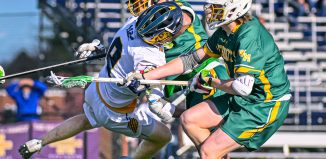Three Village to offer free pre-K; tax cap set at 3.40 percent

By Andrea Paldy
The Three Village school district announced last week that it will launch a free prekindergarten program in the fall to replace the current fee-based program housed at Nassakeag Elementary School.
The school board meeting also brought up-to-date news about the tax cap and the district’s STEM program.
Speaking about the new, free prekindergarten program, Jeff Carlson, the district’s assistant superintendent for business services, explained that it will remain at Nassakeag. He also said the program will be taught by Three Village teachers and only be open to district residents. For the past two years, Three Village has been partnering with SCOPE Education Services to run a preschool for 4-year-olds at Nassakeag.
Under the new district-only program, there will be 200 spots for 4-year-olds in 10 classes — five in the morning and five in the afternoon. Carlson said both the morning and afternoon sessions will meet for two-and-a-half hours, five days a week. Children must be potty-trained to attend and must turn 4 by Dec. 1, 2017. If there are more applicants than spaces, students will be selected by lottery, Carlson said. The current kindergarten enrollment stands at 339.
While the preschool playground and classrooms are in place, the district would still have to cover the cost of staffing the program. Carlson estimated it would cost about $450,000 in teaching salaries and benefits. However, because of declining
enrollment in the elementary schools, Three Village would have had to lay off three
elementary school teachers next fall. Now, though, the district will shift three teachers with early childhood education certifications over to the preschool. Two additional teachers will be hired.
The deadline for application is March 31, and the lottery drawing will be held April 21.
The budget
With new numbers in from the state, Three Village has a clearer picture of its finances for the coming school year. With those figures in place, Carlson said the new projected limit on the tax levy increase is 3.40 percent. That is up from an initial projection of 1.46 percent in January.
The baseline for what is commonly referred to as the tax cap is set at 2 percent, or the consumer price index — whichever is lower. In addition, each district’s maximum allowable levy increase is calculated using a formula that includes criteria such as a district’s tax base growth factor, capital projects and bond payments, Carlson said.
Three Village can expect an increase in state aid of about $247,000, based on Gov. Andrew Cuomo’s (D) executive budget for 2018. The amount does not include building aid. Last year, the district received a $3.5 million bump because of the end of the Gap Elimination Adjustment — funds taken from school aid packages to assist the state in balancing its budget. The district will not need to cut any programs for budget reasons.
Computer science
With STEM careers growing at a rate of 17 percent — compared to 9.8 percent for other fields — according to a report from the district’s computer science faculty, Three Village students have the opportunity to stay abreast of a rapidly changing field.
Stan Hanscom, a math and computer science teacher at P.J. Gelinas Junior High, said because district students are exposed to coding through the elementary STEM program, the district’s junior high computer classes offer a bridge between early exposure and offerings at the high school. Hanscom’s students learn Scratch and TI Basic for calculators, which introduce code sequencing, trouble-shooting and problem solving.
In grades eight and nine, students focus on logical thinking and learn programming using Python. Ward Melville High School offers AP computer science A, an introductory, college-level course in Java programming. Next year, students will also be able to take AP computer science principles, which focuses less on programming and more on the foundations of programming, with an interdisciplinary approach, said Katelyn Kmiotek, who teaches eighth- and ninth-graders at Gelinas Junior High. She will teach the new course in the fall.






